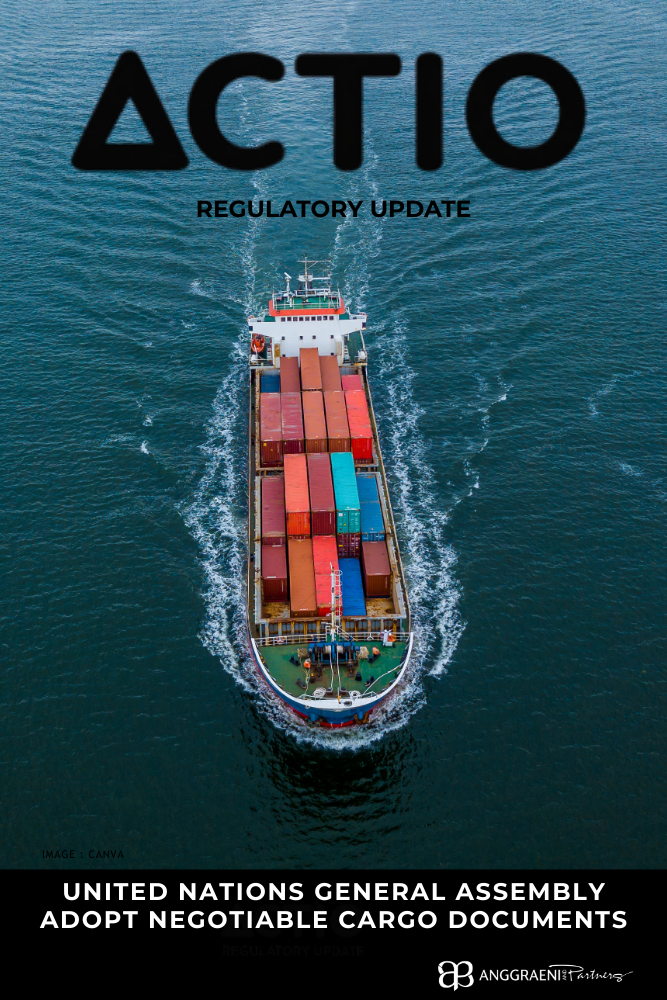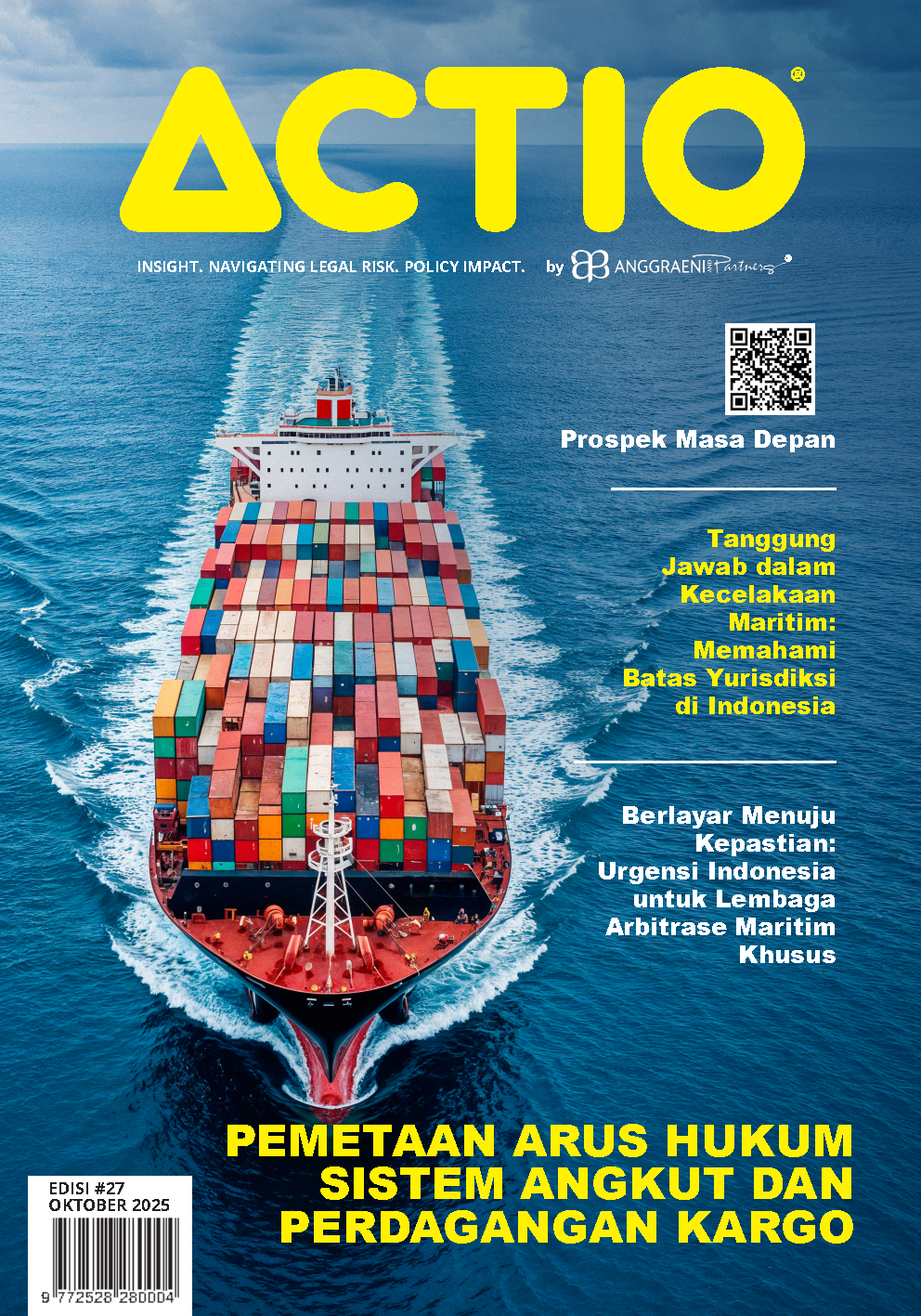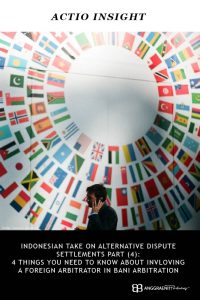Indonesian Take on Alternative Dispute Settlements Part Four : 4 Things You Need to Know about Involving a Foreign Arbitrator in BANI Arbitration
By: Setyawati Fitrianggraeni, Eva F Fauziah, Keshia Bucha[1]
Involving a foreign arbitrator in a dispute settlement in a BANI (Badan Arbitrase Nasional Indonesia – “BANI”) arbitration may be preferable in some cases. The main considerations may include the nature of the party and the dispute. BANI allows the disputing parties to appoint a foreign arbitrator under Article 10.3 of the 2022 BANI Arbitration Rules and Procedure (“BANI Rules”). Designation of a foreign arbitrator may be considered provided that the designated foreign arbitrator meets the qualification requirements and is prepared to comply with BANI Rules.
When involving a foreign arbitrator in BANI arbitration, there are at least 4 (four) points that you need to know, to help you have a well-ordered arbitration proceeding.
- Dealing with language barriers
Other than the nature of the parties and dispute, it is necessary to understand that Article 28 of Law Number 30 of 1999 concerning Arbitration and Alternative Dispute Resolution (“Arbitration Law”) and Article 15.1 of 2022 BANI Rules require that the language used at BANI arbitrations is the Indonesian language by default. Assuming that most foreign arbitrators do not speak Indonesian, parties may consider the following actions to avoid technical difficulties during the hearings, particularly if the arbitration clause does not provide the parties’ agreement on the language used in arbitration.
First, parties may consider seeking the Tribunal’s direction (as allowed by Article 18.2 of 2022 of BANI Rules) regarding the language used in the parties’ written submission and evidence at the outset of the proceeding. This would affect how the proceedings are held, including the parties’ obligation to prepare bilingual written submissions and evidence. The Tribunal’s determination on this issue may be provided in Terms of Reference for the proceedings, pursuant to Article 18.2 of 2022 BANI Rules.
Second, parties may consider seeking the Tribunal’s direction regarding the appointment of an interpreter[2], to simultaneously or concurrently interpreting for parties and the Tribunal’s discussion during the hearing. In practice, BANI will lead the engagement process and inform the parties regarding the interpreting costs which are usually borne by the parties equally.
- Award Language
The language of the arbitration will also impact whether the award should only be officially published in the Indonesian language, or also in another language. The 2022 BANI Rules provide that the award may be translated into English or another language.[3] In practice, when a foreign arbitrator or bilingual proceedings are involved, the parties will receive two language versions of an award; one in English, the other one in Indonesian. However, only the Indonesian version is submitted for registration purposes at the court.
- Live Notes during the Hearing and Official Transcription
Aside from the use of an interpreter, it is helpful for the parties and the Tribunal to follow the discussion if the hearing provides a live note, specifically if it is also conducted virtually and with the assistance of foreign counsels. A widely accepted live note will result in an official transcription,[4] which will also be helpful to record the parties’ hearings. This is helpful since the parties are not usually allowed to record the hearing in audio-visual.[5] The practice of having live notes and transcription service is a common practice in BANI and the costs are usually borne by the parties equally.
- Third-Party Electronic Presentation
Due to the possibility that the foreign arbitrator has limitations in attending the hearing physically and to cater to hybrid hearings, the parties may consider seeking the Tribunal’s direction in engaging third-party assistance in providing electronic presentation. This may be helpful, particularly if the dispute involves voluminous documents and evidence. Having this service at the hearings will also help the parties focus on the proceedings. It is worth bearing note that in such bilingual proceedings, it would be helpful to refer to documents in both languages.
Closing Remarks
Involving a foreign arbitrator who is well-versed in the subject matter of the dispute may be relevant to increase confidence in the process, and to assure the Parties that the dispute is being adjudicated to the satisfaction of the litigants. This reduces the possibility of annulment based on incorrect findings. However, there are practical and technical aspects that litigants will have to contend with. It is essential to identify possible difficulties during the hearing and provide measures to ensure that the arbitration proceeding proceeds smoothly. BANI’s approach in welcoming the involvement of foreign arbitrators is also one factor to be appreciated, as it enhances the effectiveness of arbitration proceedings in Indonesia.
[1] Setyawati Fitrianggraeni holds the position of Managing Partner at Anggraeni and Partners in Indonesia. She also serves as an Assistant Professor at the Faculty of Law, University of Indonesia, and is currently pursuing a PhD at the World Maritime University in Malmo, Sweden. Additionally, Eva Fatimah Fauziah is a Senior Associate in the International Arbitration and Litigation Group and also Head of the Legal Lab at Anggraeni and Partners, and Keisha Bucha is a Middle Associate at Anggraeni and Partners. The writers express their gratitude to Dr. Hary Elias for generously dedicating his time to provide valuable feedback on their article.
[2] Article 15.3 2022 BANI Rules
[3] Article 15.4 of 2022 BANI Rules
[4] Article 18.3 of 2022 BANI Rules
[5] Article 4(2)a of Article 2022 BANI Arbitration Rules and Procedures on Electronic Arbitration
DISCLAIMER :
This disclaimer applies to the publication of articles by Anggraeni and Partners. By accessing or reading any articles published by Anggraeni and Partners, you acknowledge and agree to the terms of this disclaimer:
No Legal Advice: The articles published by Anggraeni and Partners are for informational purposes only and do not constitute legal advice. The information provided in the articles is not intended to create an attorney-client relationship between Anggraeni and Partners and the reader. The articles should not be relied upon as a substitute for seeking professional legal advice. For specific legal advice tailored to your individual circumstances, please consult a qualified attorney.
Accuracy and Completeness: Anggraeni and Partners strive to ensure the accuracy and completeness of the information presented in the articles. However, we do not warrant or guarantee the accuracy, currency, or completeness of the information. Laws and legal interpretations may vary, and the information in the articles may not be applicable to your jurisdiction or specific situation. Therefore, Anggraeni and Partners disclaim any liability for any errors or omissions in the articles.
No Endorsement: Any references or mentions of third-party organizations, products, services, or websites in the articles are for informational purposes only and do not constitute an endorsement or recommendation by Anggraeni and Partners. We do not assume responsibility for the accuracy, quality, or reliability of any third-party information or services mentioned in the articles.
No Liability: Anggraeni and Partners, its partners, attorneys, employees, or affiliates shall not be liable for any direct, indirect, incidental, consequential, or special damages arising out of or in connection with the use of the articles or reliance on any information contained therein. This includes but is not limited to, loss of data, loss of profits, or damages resulting from the use or inability to use the articles.
No Attorney-Client Relationship: Reading or accessing the articles does not establish an attorney-client relationship between Anggraeni and Partners and the reader. The information provided in the articles is general in nature and may not be applicable to your specific legal situation. Any communication with Anggraeni and Partners through the articles or any contact form on the website does not create an attorney-client relationship or establish confidentiality.
By accessing or reading the articles, you acknowledge that you have read, understood, and agreed to this disclaimer. If you do not agree with any part of this disclaimer, please refrain from accessing or reading the articles published by Anggraeni and Partners.
For further information, please contact:
P: 6221. 7278 7678, 72795001
H: +62 811 8800 427
S.F. Anggraeni
Managing Partner
Eva F. Fauziah
Senior Associate in Practice Group International Arbitration and Litigation
Head of Legal Lab




